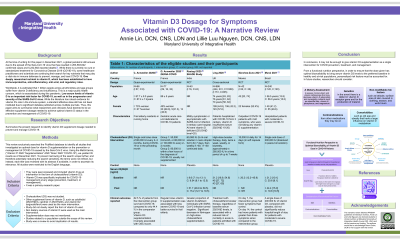Back

Objectives: Summarize the present research to identify Vitamin D3 supplement dosage needed to prevent and manage COVID-19.
Methods: A literature search was performed using the PubMed database from 2020 and 2021 and works cited from eligible results were used to identify studies related to vitamin D3 and COVID-19. The MeSH terms (“Vitamin D” AND “Supplementation” AND “Dose” AND “COVID-19”) yielded 35 results that were all open, full-text papers screened by multiple reviewers for inclusion in this study. Only primary research papers including the use of vitamin D3 (cholecalciferol) for COVID-19 management at any stage (prevention, during, or after), were considered. Papers that did not explicitly study vitamin D3, used other vitamin D sources such as dietary interventions and light therapy, or studied populations outside the scope of this review were not considered.
Results: Six studies met the eligibility criteria. Four studies observed an increase in serum vitamin D3 levels and improved COVID symptoms at doses of 10,000 IU, 40,000 IU 60,000 IU, and 80,000 IU. The two other studies found that single high dose supplementation had no significant benefit for COVID-19 outcomes at 80,000 IU and 200,000 IU. Throughout the studies, doses were given at various durations that lasted from once a day, once a week, or once every two to three months. No adverse events were associated with the administration of vitamin D3. Given that vitamin D3 is often one of multiple interventions for most patients, determining what the main causative agent may be is unlikely due to confounders.
Conclusions: Overall, there is no consensus on an optimal vitamin D3 dose. This preliminary research suggests that while vitamin D3 may be helpful in improving COVID symptoms, outcomes cannot depend on it as the single therapeutic agent. A functional nutrition approach should also be considered to ensure that the dose given has high bioavailability and is able to function properly once in the body. Future research may consider personalizing vitamin D3 recommendations based on various confounders such as dietary factors, genetics, environment, comorbidities, and contraindications to vitamin D3 supplementation.
Funding Sources: This research did not receive any specific grant from funding agencies in the public, commercial, or not-for-profit sectors.
COVID-19 and Nutrition
(PO05-23-22) Vitamin D3 Dosage for Symptoms Associated With COVID-19: A Narrative Review


Annie Lin, MS, CNS, LDN
– DCN, Maryland University of Integrative Health, Boca Raton, Florida, United States- LN
Lillie Ngyuen, MS, CNS, LDN
– Maryland University of Integrative Health
Presenting Author(s)
Co-Author(s)
Disclosure(s):
Annie Lin, MS, CNS, LDN: No relevant financial relationship(s) with ineligible companies to disclose.
Objectives: Summarize the present research to identify Vitamin D3 supplement dosage needed to prevent and manage COVID-19.
Methods: A literature search was performed using the PubMed database from 2020 and 2021 and works cited from eligible results were used to identify studies related to vitamin D3 and COVID-19. The MeSH terms (“Vitamin D” AND “Supplementation” AND “Dose” AND “COVID-19”) yielded 35 results that were all open, full-text papers screened by multiple reviewers for inclusion in this study. Only primary research papers including the use of vitamin D3 (cholecalciferol) for COVID-19 management at any stage (prevention, during, or after), were considered. Papers that did not explicitly study vitamin D3, used other vitamin D sources such as dietary interventions and light therapy, or studied populations outside the scope of this review were not considered.
Results: Six studies met the eligibility criteria. Four studies observed an increase in serum vitamin D3 levels and improved COVID symptoms at doses of 10,000 IU, 40,000 IU 60,000 IU, and 80,000 IU. The two other studies found that single high dose supplementation had no significant benefit for COVID-19 outcomes at 80,000 IU and 200,000 IU. Throughout the studies, doses were given at various durations that lasted from once a day, once a week, or once every two to three months. No adverse events were associated with the administration of vitamin D3. Given that vitamin D3 is often one of multiple interventions for most patients, determining what the main causative agent may be is unlikely due to confounders.
Conclusions: Overall, there is no consensus on an optimal vitamin D3 dose. This preliminary research suggests that while vitamin D3 may be helpful in improving COVID symptoms, outcomes cannot depend on it as the single therapeutic agent. A functional nutrition approach should also be considered to ensure that the dose given has high bioavailability and is able to function properly once in the body. Future research may consider personalizing vitamin D3 recommendations based on various confounders such as dietary factors, genetics, environment, comorbidities, and contraindications to vitamin D3 supplementation.
Funding Sources: This research did not receive any specific grant from funding agencies in the public, commercial, or not-for-profit sectors.

.png)
